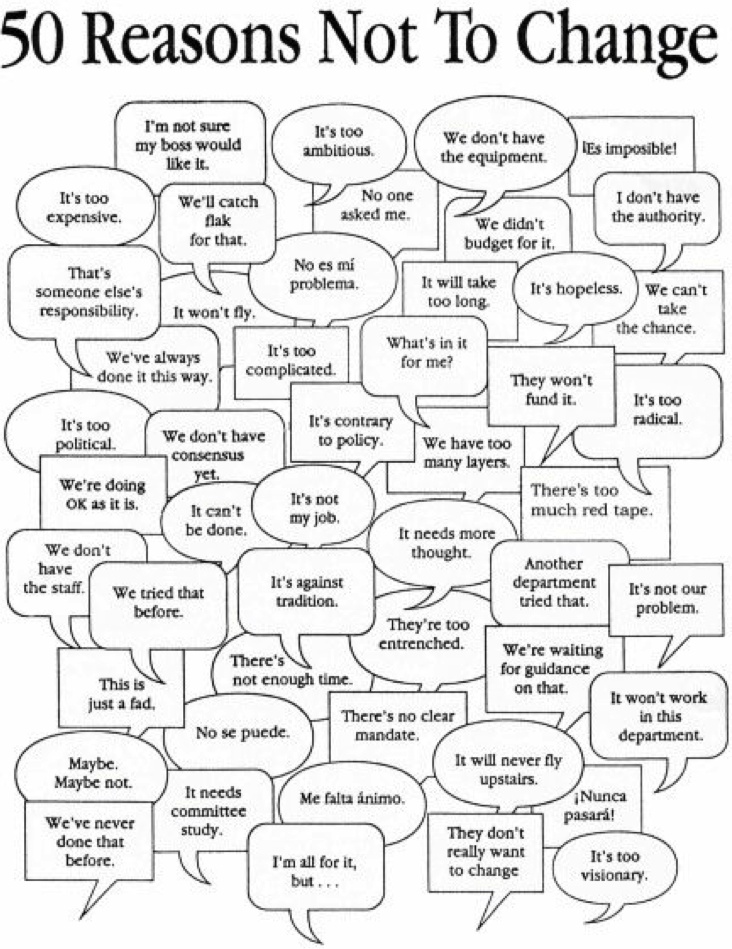Appendix B. Handy Rebel Lists
20 Ways to Be a More Effective Rebel
- Be positive.
- Frame it.
- Stay out of drama.
- Judge ideas, not people.
- When angry, stop and wonder why.
- Strive for influence, not power.
- Start the flame; tap into the collective brilliance of others to fuel the fire.
- Share the glory.
- Communicate in ways that create clarity from complexity.
- Address the cost/value tradeoff.
- Let ideas breathe.
- Pick the right boss or executive sponsor.
- Ask good questions; become a keen listener.
- Learn how to facilitate messy collaboration.
- Address the fears.
- Show how success can be measured.
- Learn how to have constructive conversations.
- Be thoughtful in all you do.
- Know when to walk away.
- Believe you are enough.
Top 10 Rebel Mistakes
- Breaking the rules because the rules aren’t for you
- Being against the status quo instead of being for something
- Skimping on learning the organizational landscape
- Not linking ideas to what the organization really values
- Avoiding conflict and controversy
- Putting things in the wrong order
- Wasting opportunities
- Flirting with the dark side
- Going it alone
- Losing your sense of humor
Top 10 Rebel Fears
- Losing my job
- Hurting my chances for a promotion
- Upsetting my boss
- Damaging my reputation
- Alienating my colleagues
- Conflict, having to disagree with others
- Looking dumb or not smart enough
- Someone else taking credit for my idea
- Having to present my idea to management
- Being made accountable for running the entire effort
One-Line Inspirations
All you need to know about people is whether they define themselves in terms of their fears of their opportunities.
— Carmen Medina
The knowers and seers always live on the outskirts of the village. Always.
— Patti Digh
They must often change, who would be constant in happiness or wisdom.
— Confucius
On why we’re needed:
Impossible is not a fact. It’s an opinion. Impossible is not a declaration. It’s a dare. Impossible is potential. Impossible is temporary. Impossible is nothing.
— Muhammad Ali
We are convinced that any business needs its wild ducks.
— Thomas Watson
If you’re not part of the problem, you can’t be part of the solution.
— Adam Kahane
About the work:
Without grit there is no pearl.
— Anonymous
A smooth sea never made a skillful mariner.
— Anonymous
A blessing shouted too early in the morning is heard by the neighbors as a curse.
— Proverbs 27:14
Guidelines for Framing
- Always start with values.[7] Pick a frame where your position exemplifies a value everyone holds—like fairness.
- Never answer a question framed from your opponent’s point of view. Always reframe the question to fit your values and your frames.
- Be sincere. Use frames you really believe in, based on values you really hold.
- If you remember nothing else about framing, remember this: Once your frame is accepted into discourse, everything you say is just common sense. Why? Because that’s what common sense is: reasoning within a commonplace accepted frame.
Opposition Tactics: The 10 Ds to Try to Stop Your Idea
Here are the 10 Ds that BBBs and others may use to try to stop your idea, courtesy of the Work Group for Community Health and Development at the University of Kansas:
- Deflection
- Your opponents may try to deflect you in two different ways. First, they might try to turn the debate to other issues, instead of focusing on the real problem. Alternatively, your opponents may try to “pass the buck” to a group with little or no authority—for example, to a department within their agency, such as the community relations department or to a different organization altogether.
- Delay
- With delay tactics, the opposition may say it is working on the problem, when the reality is that nothing is being done. They may also suggest that more information is needed (and form committees to gather it, as evidence of good faith) when there is already plenty of information on the problem. One of the worst consequences of the delay tactic is that it can hurt the momentum of a strong organization, and it can cause community members to lose heart and give up.
- Denial
- Denial is used when your opponent refuses to admit there is any truth to either: a) the problem you say exists or b) the solution that you propose. A second kind of denial is used when officials or other opponents say they would like to help but don’t have the resources or clout necessary to actually make a change.
- Discounting
- Discounting occurs by suggesting that the problem you are working on isn’t really that important or by questioning the legitimacy of your organization or its efforts.
- Deception
- Deception is the act of intentionally misleading someone by lying or by “forgetting” to tell the whole story. Deceptions may be carried out in a variety of ways, such as trying to confuse your organization with bureaucratic nonsense and red tape, misrepresenting statistics, or making suggestions that in reality have nothing to do with what you are trying to accomplish.
- Dividing
- Opponents may try to divide a group over controversial issues. By doing so, they hope to reduce the overall effectiveness of your organization or coalition. At the most extreme point, opponents may try to “buy off” members with offers of jobs or other incentives.
- Dulcifying, or appeasing
- To dulcify an organization is to try to appease or pacify members with small, meaningless concessions. This tactic is particularly tricky because it may be difficult to determine the line between compromise (which your group may find helpful) and allowances that turn out to be meaningless.
- Discrediting
- Discrediting is similar in many ways to discounting. When a member of the opposition tries to discredit an organization, he may attempt to make your group look incompetent (unreasonable, unnecessary, etc.) to the community at large. Your motives and ways of accomplishing your goals are both called into question.
- Destroy
- The destroy tactic has the simple, clear goal of trying to ruin your organization or initiative in any way possible.
- Deal
- To “deal” with a group often means to achieve a compromise. In some situations, this can be a major victory for your group. It’s important when dealing with the opposition, though, to make sure that what you get is equal to what you give; this isn’t the time to be charitable. Make sure that your group’s overarching principles are always foremost in your mind when making a deal with a foe.
Communicating Your Ideas
- Show what’s at stake.
- Show how the idea relates to what they want.
- Paint a picture of what could be.
- Make the status quo unappealing.
- Show that the idea can work.
- People support ideas that they think can work.
- Be positive and pithy.
- Keep it short.
- Build support.
- If 10 percent of the people in an organization believe in an idea, it is highly likely to be adopted.

